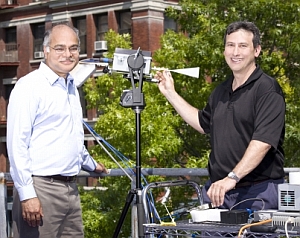Researchers at Polytechnic Institute of New York University (NYU-Poly) in Brooklyn received federal, state, and business funding for a study of new wireless technologies that can define the next generation of mobile devices. Funders of the project include the National Science Foundation, Empire State Development Division of Science, Technology and Innovation (NYSTAR), and industry supporters InterDigital, National Instruments, and faculty start-up company Asension Laboratories.
National Science Foundation (NSF) is providing an Accelerating Innovation Research grant of $800,000, while NYSTAR and industry backers are contributing $1.2 million for the project. Shivendra Panwar, director of NYU-Poly’s Center for Advanced Technology in Telecommunications is the principal investigator, with Theodore Rappaport, director of the Wireless Internet Center for Advanced Technology (WICAT) at NYU-Poly, serving as co-investigator.
The project aims to develop a more capable and less expensive wireless infrastructure that takes advantage of smaller, lighter antennas with directional beaming to bounce signals off of buildings. This fifth generation or 5G network would use the now uncrowded millimeter-wave spectrum, where 50 to 100 times more user capacity is readily available. The research is expected to result in smaller, smarter cells with devices that cooperate rather than compete for spectrum.
Rappaport’s research combines wireless communications with computing and medical applications. He is a professor in both NYU’s mathematics department and medical school’s radiology department. Most of the research on the 5G project is expected to be done at WICAT, of which Rappaport is the director. WICAT is an NSF-funded research center that besides NYU-Poly includes Auburn University, University of Virginia, Virginia Tech, and University of Texas at Austin.
Industry participants in the 5G project include National Instruments, a producer of test and measurement equipment, and InterDigital, a developer of wireless technologies for mobile devices, networks and services. Both companies will provide equipment and software for testing the products of the initiative. Electrical and computer engineering professor Michael Knox, founder of start-up company Asension Laboratories, is expected to lead research into full duplex antenna technology that enables simultaneous transmission and reception on the same RF carrier frequency.
Read more:
- Chip Set Developed for High Speed Wireless Data Transfers
- Grant to Fund Research on Network Efficiency Math Theory
- NSF Computer Science Funding Addresses Robots, Big Data
- Gaps Found in Satellite Telephone Encryption Algorithms
* * *


 RSS - Posts
RSS - Posts
[…] New Study to Examine Next Generation Mobile Networks […]
[…] New Study to Examine Next Generation Mobile Networks […]
[…] New Study to Examine Next Generation Mobile Networks […]